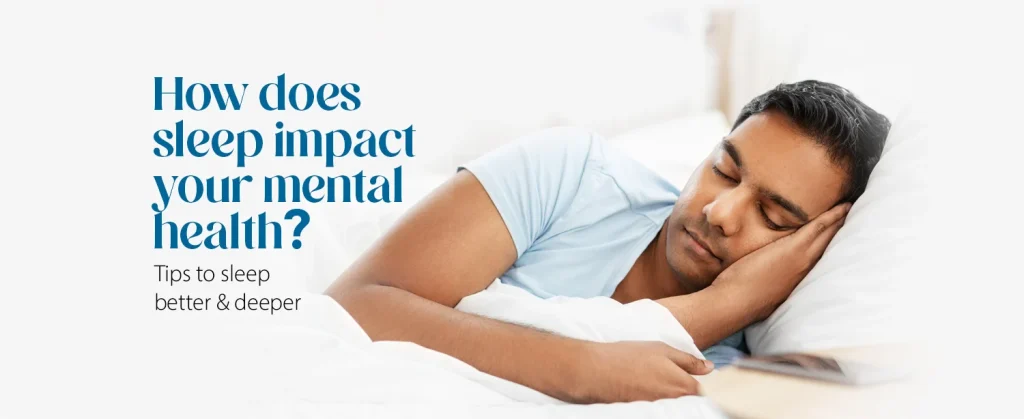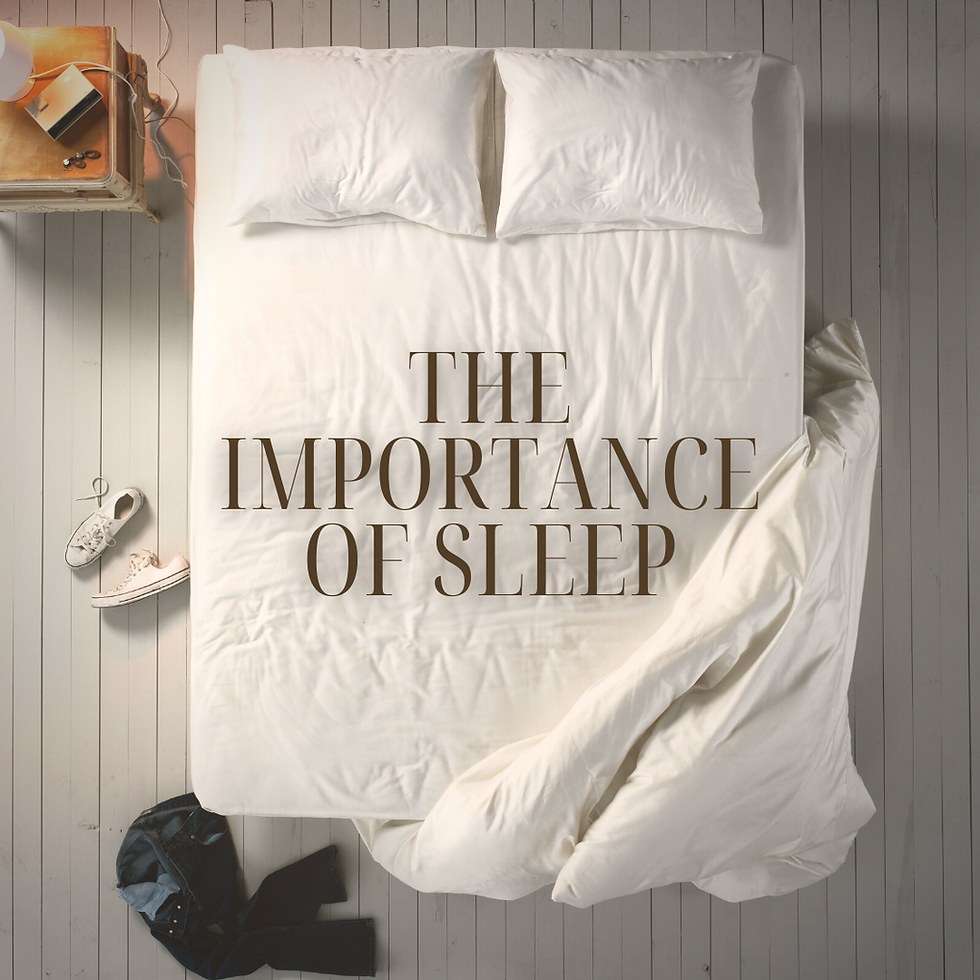The Impact of Sleep on Mental Health
Introduction

Sleep is an important aspect of overall health, playing a very vital role in physical well-being, cognitive function, and emotional stability. Despite its significance, sleep is often overlooked and undervalued in our fast-paced society. This article explores and dives into the extreme impact of sleep on mental health, inspecting how sleep affects various aspects of mental well-being, the consequences of sleep deprivation, and strategies to improve sleep quality.
The Relationship Between Sleep and Mental Health
- Sleep and Brain Function: Sleep is necessary for proper brain function. During sleep, the brain processes and consolidates memories, clears out toxins, and restores energy levels. Adequate sleep enhances cognitive functions such as attention, learning, problem-solving, and decision-making. Conversely, lack of sleep impairs these functions, leading to difficulties in concentrating, remembering information, and making sound decisions.
- Sleep and Emotional Regulation: Emotional regulation is closely linked to sleep quality. Sleep helps regulate the brain’s emotional centers, particularly the amygdala, which is responsible for processing emotions. Adequate sleep allows for balanced emotional responses, while sleep deprivation can lead to heightened emotional reactivity, mood swings, irritability, and an increased risk of emotional disorders such as anxiety and depression.
- Sleep and Mood Disorders: There is a cooperative relationship between sleep and mood disorders. Poor sleep can accord to the development and aggravation of mood disorders, while mood disorders can disrupt sleep patterns. Conditions such as depression, anxiety, and bipolar disorder are often accompanied by sleep disturbances, including insomnia, hypersomnia, and fragmented sleep.
- Depression: Insomnia and hypersomnia are common symptoms of depression. Lack of sleep can worsen depressive symptoms, creating a dangerous cycle of poor sleep and worsening mood. Adequate sleep can help improve mood and lessen depressive symptoms.
- Anxiety: Anxiety disorders often involve sleep disturbances. Worry and hyperarousal can make it difficult to fall asleep and stay asleep. Poor sleep can further increase anxiety levels, creating a feedback loop of anxiety and sleep problems.
- Bipolar Disorder: Sleep disturbances are a hallmark of bipolar disorder. During manic episodes, individuals may experience reduced need for sleep, while depressive episodes can lead to hypersomnia. Stabilizing sleep patterns is important in managing bipolar disorder.
- Sleep and Stress: Sleep and stress are intimately connected. Stress can interfere with sleep by causing hyperarousal, increased heart rate, and heightened anxiety, making it difficult to fall asleep and stay asleep. Conversely, lack of sleep can increase the body’s stress response, leading to elevated cortisol levels and exacerbating stress. Chronic sleep deprivation can contribute to the development of stress-related disorders such as chronic fatigue syndrome and burnout.
Consequences of Sleep Deprivation on Mental Health
- Cognitive Impairment: Sleep deprivation impairs cognitive functions, leading to difficulties in concentration, memory, and decision-making. It affects attention, alertness, and reaction times, increasing the risk of accidents and errors. Chronic sleep deprivation can lead to long-term cognitive decline and an increased risk of neurodegenerative diseases such as Alzheimer’s.
- Emotional Instability: Lack of sleep can lead to emotional instability, characterized by mood swings, irritability, and increased emotional reactivity. It reduces the brain’s ability to regulate emotions, leading to heightened stress, anxiety, and depressive symptoms. Sleep-deprived individuals are more likely to experience negative emotions and have difficulty coping with stress.
- Mental Health Disorders: Sleep deprivation is a significant risk factor for the development of mental health disorders. Chronic poor sleep increases the risk of developing conditions such as depression, anxiety disorders, and bipolar disorder. It can also exacerbate existing mental health conditions, making them more difficult to manage.
- Reduced Quality of Life: Poor sleep quality negatively impacts overall quality of life. It affects daily functioning, productivity, and relationships. Sleep-deprived individuals are more likely to experience difficulties in personal and professional life, leading to reduced life satisfaction and well-being.
Strategies to Improve Sleep Quality
- Establish a Consistent Sleep Schedule: Going to bed and waking up at the same time every day helps regulate the body’s internal clock, making it easier to fall asleep and wake up naturally. Consistency reinforces the sleep-wake cycle and improves sleep quality.
- Create a Sleep-Conducive Environment: Create a relaxing sleep environment by keeping the bedroom cool, dark, and quiet. Use blackout curtains, earplugs, or a white noise machine to minimize disruptions. Invest in a comfortable mattress and pillows to enhance comfort.
- Practice Relaxation Techniques: Relaxation techniques such as deep breathing, progressive muscle relaxation, and meditation can help reduce stress and anxiety, making it easier to fall asleep. Establishing a pre-sleep relaxation routine can signal to the body that it’s time to wind down.
- Limit Exposure to Screens: The blue light emitted by screens (phones, tablets, computers) can interfere with the production of melatonin, a hormone that regulates sleep. Avoid screens at least an hour before bedtime or use blue light filters to reduce the impact on sleep.
- Exercise Regularly: Regular physical activity promotes better sleep by reducing stress, anxiety, and depressive symptoms. Aim for at least 30 minutes of moderate exercise most days of the week, but avoid vigorous exercise close to bedtime as it can interfere with sleep.
- Be Mindful of Diet and Caffeine Intake: Avoid large meals, caffeine, and alcohol close to bedtime. Caffeine and nicotine are stimulants that can interfere with sleep. Opt for a light snack if you’re hungry before bed, but avoid heavy or spicy foods that can cause discomfort.
- Limit Naps: While short naps can be beneficial, long or irregular napping can negatively affect nighttime sleep. If you need to nap, limit it to 20-30 minutes and avoid napping late in the afternoon.

Sleep plays a critical role and an important role in maintaining mental health and overall well-being. Adequate sleep enhances cognitive function, emotional regulation, and stress management, while sleep deprivation can lead to cognitive impairment, emotional instability, and increased risk of mental health disorders. By understanding the impact of sleep on mental health and adopting strategies to improve sleep quality, individuals can enhance their mental and emotional well-being. Prioritizing sleep as an essential component of health can lead to a more balanced, productive, and fulfilling life. See more
